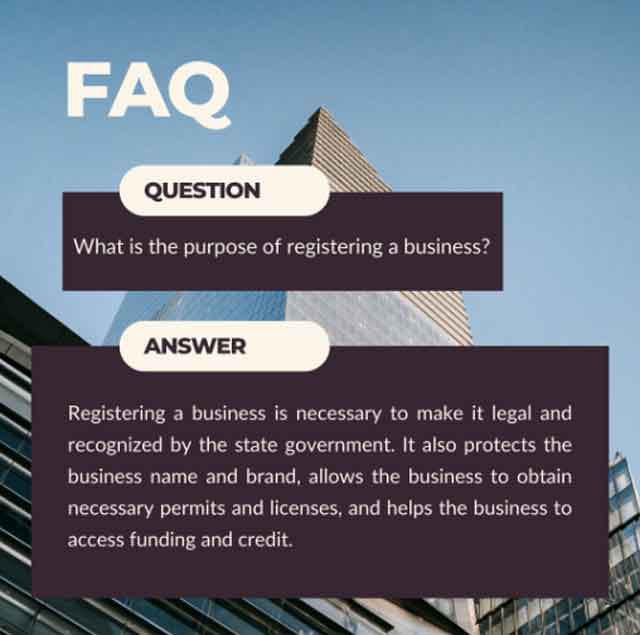If you’re thinking about starting a business, you might have encountered the term “registered agent” and wondered about its significance. A registered agent is a crucial aspect of an LLC and performs an essential role in ensuring that your business is legally compliant.
This article will delve into what a registered agent is, why your LLC must have one, and what factors to consider when selecting one.
Whether you’re a new entrepreneur or have been operating your LLC for an extended period, it’s crucial to comprehend the importance of a registered agent for your company’s success. Let’s explore these aspects in detail!
What Is a Registered Agent?
If you’re wondering, “what is a registered agent?” A registered agent is a person or company that is assigned to receive official mail and service of process for your business. They may also be referred to as a statutory agent, resident agent, or agent for service of process.
It’s an essential requirement for all registered business entities, including corporations and nonprofits, to designate one on their formation documents in every state.
This ensures that legal and official documents can be served to the LLC without any delays or issues. These documents, commonly known as “articles of organization” or “articles of incorporation,” are filed with the state and contain information that is made public.
What Does a Registered Agent Do?
If you’re wondering what is a registered agent and what does a registered agent do, the primary duty of a registered agent is to be present to accept the service of process, which could be delivered through various means like a process server, sheriff, or certified mail with return receipt requested, depending on the state. Some states may permit other modes of delivery.
To ensure personal jurisdiction over a defendant in a legal case, the court must have valid service of process, as mandated by the Due Process Clause of the U.S. Constitution. Without this, the court cannot pass a ruling ordering the defendant to perform any action.
When initiating legal proceedings against an entity like a corporation or LLC, identifying the authorized individual to receive the documents can pose a challenge.
Not every person connected to the LLC or corporation is authorized, and even if the plaintiff knows who is authorized, it may be difficult to locate those individuals.
However, as each LLC or corporation must assign a registered agent, and the name and location of the registered agent are publicly accessible, plaintiffs may find it easier to serve the process.
Who Needs a Registered Agent?
All LLCs and corporations that are established under the regulations of a state or the District of Columbia are obligated to appoint and sustain a registered agent within their formation state and in every other state where they’re authorized to conduct business as a foreign LLC or corporation.
The requirement for a registered agent also applies to other statutory entities, specifically those that offer limited liability to their owners, like limited partnerships and limited liability partnerships. Hence it’s important to understand what is a registered agent for an LLC.
This provision is mandatory, as mandated by the state corporation and LLC statutes, and not adhering to this rule may lead to penalties imposed by the law.
Certain state or federal regulations may necessitate the appointment of a registered agent for specific businesses or activities.
This is in addition to the state laws for LLCs and corporations, which mandate the appointment and retention of a registered agent by domestic and foreign entities.
For instance, interstate motor carriers must register with the Federal Motor Carrier Safety Administration and choose an agent for process service.
This is frequently required for out-of-state firms to enable the administering agency or state residents doing business with the company to reach it and potentially serve legal documents by contacting or serving the registered agent.
A registered agent obligation imposed by a statute other than the business entity statute is sometimes known as a “special agency.”

Do I Need a Registered Agent?
When establishing a new business and exploring different business structures like LLCs, you may question what is a registered agent for an LLC and whether it’s necessary.
The truth is, it’s crucial to have a registered agent listed as a mandatory part of your LLC or corporation as per legal requirements.
When to Use a Professional Registered Agent?
When creating an LLC, one of the critical decisions that owners must make is selecting a registered agent. Alongside choosing the entity name, formation state, and entity type, it’s essential to understand what is a registered agent for an LLC and why it’s crucial to have one.
To determine if hiring a professional registered agent is necessary for your LLC or corporation, and what does a registered agent does, there are a set of questions you can ask yourself.
If you answer any of these questions positively, it’s highly recommended that you appoint a professional registered agent.
- Are you worried about adhering to the governing business entity laws’ compliance requirements and the repercussions of failing to do so? If so, you might want to choose a knowledgeable registered agent. Professional service firms frequently offer a wide variety of services for LLCs, corporations, and other forms of business organizations to help them with their compliance obligations. These services are in addition to the professional registered agent’s statutory duties of receiving and forwarding documents.
- Do the individual owners, staff members, or other people who could be listed as registered agents have the authority to establish their own working hours or locations? Keep in mind that during business hours, the registered agent must be present at the statutory site.
- Did you set up shop or incorporate somewhere other than your state of operation? It’s advantageous to have the same registered agent in each state if a corporation or LLC plans to conduct business in several states. The administrative overhead is reduced, and it’s much simpler to maintain track of who the registered agent is in each state.
- Would you want to keep your address a secret? The registered agent’s address is made available to the general public. If a professional registered agent is used, the address of the professional registered agent will be disclosed.
- Will you ever change your address? If you want to use the registered office as a person’s or a company’s business address, you must remember to update the registered office if the address changes.
- Do you have visitors to your house or place of business? If so, you probably don’t want your clients or customers to worry about why the company is being sued when they see a sheriff or process server delivering papers.
- Does your firm operate in several states?
- Will the business have divisions? In the state where it was formed and in any other states where it would be acceptable, each subsidiary must have a separate registered agent. It can be challenging to keep track of the arrivals and departures of certain registered agents for each subsidiary. The administrative burden for the person responsible for complying with the registered agent requirement is lessened by utilizing the same registered agent for the parent and each subsidiary, which can be accomplished by using a professional registered agent.
Who Can Be a Registered Agent?
To qualify as a registered agent, two fundamental criteria must be satisfied. Firstly, the registered agent must be a resident of the state where the company is registered.
Secondly, the registered agent must have a physical address where legal documents can be delivered, and a P.O. mailbox cannot serve as an official address.
Although these requirements are straightforward, it’s crucial to carefully consider the appropriate individual or entity to serve as your registered agent and understand what does a registered agent does.

Should I Be My Own Registered Agent?
Registering yourself as an agent for your business can result in complications if you do not have a fixed physical address or if you’re unavailable at the address you have listed during regular business hours.
What Can Happen If You Don’t Have a Registered Agent?
If you’re wondering what is a registered agent, it’s typically required to select one when registering an LLC. In the event that you need to change your registered agent, it’s important to submit a form to reflect this update.
Neglecting to have a registered agent may not only result in legal consequences but also pose other potential risks for the company.
Default Judgments
If a limited liability company (LLC) is sued and lacks a registered agent to receive a summons, they may not be served in an appropriate time frame. This highlights the importance of understanding what is a registered agent for an LLC and why it’s necessary.
As a result, the plaintiff may serve the company in another way, which could prevent the company from responding to the summons within the required time frame.
In some states, the plaintiff may serve the Secretary of State if attempts to serve the registered agent are unsuccessful.
If no registered agent or other suitable person is found, the plaintiff may ask the court for permission to provide notice of the lawsuit through “substituted service,” such as publishing it in a newspaper or using other methods that may not result in the direct notice.
In case of a valid service and no response from an LLC or corporation, the plaintiff is entitled to a default judgment, regardless of the merit of the lawsuit or the defendant’s chances of winning. This can result in irreversible damage to the company’s assets.
Understanding what is a registered agent for an LLC is crucial because if the LLC or corporation fails to follow the state’s requirement for a registered agent, it may lead to a default judgment.
While courts strive to avoid defaults and reverse them, failure to fulfill this requirement could make it difficult for the court to do so in such cases. Hence it’s crucial to have a clear understanding on what does a registered agent does.
Loss of Good Standing
Understanding what does a registered agent do is crucial for any company’s good standing. Failure to maintain a registered agent or keep state information updated can put that standing in jeopardy.
As an expert in digital marketing, I can assure you that it’s essential to stay on top of these requirements to avoid any setbacks in your business operations.
This is because the state may send important annual or biennial reports to the registered agent, and if they’re not up to date, the company may miss the deadline for filing them.
Losing good standing can have serious consequences for a business, including the inability to bring a lawsuit in the state, expand into other states, or secure financing for growth.
Fines and Penalties
Failure to comply with statutory requirements may result in LLCs or corporations being subject to financial penalties.
Administrative Dissolution
As previously mentioned, it’s possible for the state to dissolve an entity through administrative means. In such instances, the entity’s owners may be held liable for debts owed to business creditors.
While administrative dissolution can usually be resolved, there may be certain cases where it cannot be remedied, especially if too much time has passed.
5 Reasons You Might Need to Use a Registered Agent Service
If you’re unsure of whether to serve as your own registered agent or hire a third-party service, it’s important to consider what does a registered agent do and take the following factors into consideration:
1. Official Mail Duties
Sorting through unwanted mail and important documents can be overwhelming for companies, which is why many opt to delegate this task to a reliable registered agent service. Hence crucial to understand what does a registered agent do.
By doing so, businesses can guarantee that all crucial documentation will be efficiently managed and delivered to them in a timely manner.
2. You Want to Keep Your Personal Address Private
If you choose to identify as a registered agent for your company, there’s a possibility that your personal details may become public knowledge, particularly if you operate from a home-based office.
However, engaging the services of a registered agent provides a layer of privacy protection.
3. You Want to Keep Legal Matters Confidential
Certain states require legal notifications to be handed over to individuals by a law enforcement officer or process server.
Have you ever wondered what does a registered agent do? Well, if a company is entangled in a legal proceeding and their registered agent is not available, they may receive legal papers in front of customers and workers, causing rumors and awkwardness.
However, by utilizing the services of a registered agent, such situations can easily be avoided.
4. You Aren’t in the Office During Normal Business Hours
If you’re wondering what is a registered agent for an LLC, it’s someone who must be available at the designated address during normal business hours. This requirement ensures that the LLC has a reliable point of contact for legal and other official matters.
Are you wondering what does a registered agent do? If you have an unconventional work schedule or an unpredictable timetable, or if you’re always on the go and don’t stay fixed in one location, then a registered agent service may be the perfect solution for your needs.
These services usually require an annual fee ranging from $50 to $300, but they ensure that all crucial documents regarding your business are delivered to you promptly.
5. You Want to Expand Your Business to Other States
Are you wondering what does a registered agent do for your business? Well, as a registered agent, you’re only allowed to serve in the state where you reside.
So if your business expansion plans include other states, you will need a registered agent who resides or is authorized to do business in that particular state.
One alternative is to use a registered agent service. It can be a viable option, hence crucial to understand the registered agent’s meaning.
Best Registered Agent Services
Take a look at the best registered agent services on the market.
ZenBusiness

ZenBusiness is a digital platform that assists entrepreneurs and small business owners in launching and expanding their businesses.
ZenBusiness offers a range of affordable services to assist businesses, including LLC formation packages, annual report filing, and registered agent services.
Additionally, ZenBusiness provides ongoing support and resources to help your business stay compliant and grow.
Swyft Filings

Swyft Filings is a company that specializes in providing efficient and hassle-free LLC setup solutions to individuals.
Their range of services includes incorporation, compliance assurance, and registered agent services. Swyft Filings has got you covered with their comprehensive registered agent service.
Swyft Filings also offers personalized assistance to aid businesses in navigating the process of setting up an LLC and complying with state and federal regulations.
Tailor Brands

Tailor Brands is a digital LLC formation service that offers assistance to businesses in creating a consistent and professional brand identity.
In addition to designing logos, business cards, and social media branding, they provide a variety of design tools and resources for businesses to use in creating and personalizing their own branded assets.
Northwest Registered Agent

Look no further than Northwest Registered Agent. Our company specializes in providing a range of business services, including registered agent services, compliance management, and document filing.
They offer personalized assistance to help companies stay compliant, grow, and are a reliable partner for LLC formation services. Read the complete Northwest Registered Agent review.
Incfile

If you’re wondering what is a registered agent for an LLC, Incfile can help. They provide fast and affordable LLC formation services that include registered agent services, compliance management, and document filing.
The process of forming an LLC with Incfile is made easy and stress-free through their user-friendly platform. Furthermore, they provide continued assistance and resources to ensure businesses remain compliant and successful.
Their emphasis on affordability and convenience makes them an excellent choice for LLC formation services.
What is a Registered Agent? – Frequently Asked Questions
What Are the Pros and Cons of Being My Own Registered Agent?
The main advantage of self-listing is that it doesn’t cost anything. If you’re wondering what is a registered agent for an LLC, there are some disadvantages to consider.
For instance, there’s a chance of overlooking vital documents or messages and disclosing your private data through the release of the address you register for your LLC or corporation.
Can I Be Penalized for Not Having a Registered Agent for My Business?
Wondering what is a registered agent? It’s crucial to appoint one to avoid facing serious repercussions, such as missing out on vital government and tax information.
Failure to do so could also result in losing important notifications regarding any legal actions against your organization. Additionally, your company’s ability to operate may be revoked by the state.
Can a Registered Agent Have a Virtual Address?
If you’re wondering, “what is a registered agent?”. They’re required to have a physical address where they can receive physical mail during business hours.
Understanding what is a registered agent for an LLC is crucial. This is an essential requirement for any registered agent, which ensures that their clients and other stakeholders can communicate with them effectively.
What Is the Service of Process?
The act of providing a legal notification to an individual or a company is known as a service of process. Legal notices, including summonses or subpoenas, necessitate prompt action from the recipient, such as appearing in court, discontinuing an activity, or producing documents.
If you’re wondering what is a registered agent, it’s typically the designated individual or entity responsible for receiving service of process on behalf of a business.
Having a registered agent is crucial, particularly when your company is involved in legal proceedings, as the registered agent is responsible for receiving any official summons or legal documents from a process server.
Can I Use My Registered Agent as My Business Address?
Are you wondering what is a registered agent? Well, registered agent services provide their own address for use on official documents, thereby safeguarding the confidentiality of your personal address. This ensures that your private information is not disclosed to the public.
Bottom Line on What is a Registered Agent
Knowing what is a registered agent is crucial when selecting one for your corporation or LLC. This role carries immense significance and must not be taken lightly, as any missteps can have catastrophic consequences for the business.
If you’re wondering what is a registered agent, it’s important to note that there are expert registered agent companies available to help.
Whether you need a registered agent in your home state or another state, it’s crucial to consider hiring a professional registered agent for accountability. Their expertise can ensure that the process runs smoothly and effectively.


![Nixtons Group Review: End to End Concerning Market Order [nixtonsg.com] Nixton's Group](https://www.netnewsledger.com/wp-content/uploads/2024/07/investing-site-218x150.jpg)

![Givenex Opinie: Encountering the Interesting Components of Money-related Exhibitions [givenex.com] Givenex](https://www.netnewsledger.com/wp-content/uploads/2024/07/givernex-218x150.jpg)


